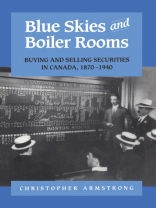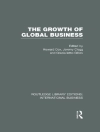Blue Skies and Boiler Rooms describes the evolution of the securities market in Canada, from the onset of trading, through the boom of the 1920s and the depression of the 1930s, to the outbreak of the Second World War.
The book documents the problems of fraud, misrepresentation, and manipulation of prices, which plagued the securities industry from the outset and which eventually led to market regulation, first by the stock exchanges and later, after the First World War, by governments. Some people argued that regulation to prevent abuses should be modelled on the American ‘blue sky’ legislation, so named after the promises of smooth-talking con men in fly-by-night operations who victimized the unwary with sales pitches offering shares in virtually anything. Even ‘the blue sky above.’ Such legislation became necessary as shady types marketed shares of doubtful value through ‘boiler rooms, ’ which used high-pressure mail and telephone selling methods to separate people from their money.
This is a tale well told, with a splendid cast of crooks and raffish characters. It is also an in-depth study based on extensive primary research that captures the distinctiveness of the development of the Canadian securities market. Armstrong’s book shows that today’s Bre-X saga is only the latest in a series of episodes in which investors have fixed their hopes for quick and easy profits on speculative mining stock. It will be welcomed by students and scholars of financial, business, and economic history.












